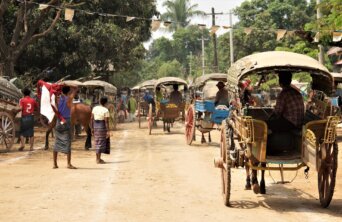- About
- Topics
- Picks
- Audio
- Story
- In-Depth
- Opinion
- News
- Donate
- Signup for our newsletterOur Editors' Best Picks.Send
Read, Debate: Engage.
| topic: | Human Rights |
|---|---|
| located: | Myanmar |
| editor: | Lital Khaikin |
International medical aid to Myanmar’s Rakhine State has been effectively paralysed amid an escalation of violence over the summer. As international aid programs remain severely underfunded and the need for humanitarian response in Myanmar is soaring, the United League of Arakan (ULA), an Arakanese political organisation, is filling the aid vacuum.
All warring parties in Rakhine State have been accused of human rights abuses and war crimes, including the Arakha Army (AA), the ULA’s military branch. A report published by Human Rights Watch (HRW) on August 12 described attacks by the AA in the region as indiscriminate, using helicopter gunships, artillery and ground assaults. The AA has rejected allegations, citing insubstantial evidence and misplaced blame for actions by the junta and other Rohingya militant groups.
In May, the town of Buthidaung was ravaged by arson, displacing 4,000 people to the Naf River near Bangladesh. Based on analysis via satellite imagery and thermal anomaly data, the report infers the targeted arsons of over 40 villages and hamlets in the surrounding township over a month.
Chief of the Myanmar Team at the United Nations Office of the High Commissioner for Human Rights, James Rodehaver, criticised the impeding of residents’ safe passage out of Buthidaung toward the border with Bangladesh, citing extortion and abuse at checkpoints out of the town.
Impacted by the arson and fighting in the region, Médecins sans frontières (MSF) paused the operations of over 14 mobile clinics in June. By mid-July, medical aid in Rakhine was indefinitely suspended as electricity networks no longer reliably supply power, and a lack of fuel made it impossible to perform some medical procedures. The periodic blackouts of phone networks have left many without access to consultations, mental health support, or other assistance. Only one mobile clinic was reported as still operating in Sittwe.
International aid programs for Myanmar remain sorely underfunded. The UNHCR reports that $95.9 million is still needed this year to address the humanitarian crisis in Myanmar. Just under half of this sum is intended for well-being and basic needs. As Bangladesh is seeing the highest influx of Rohingya refugees since 2017, the World Food Programme has responded by increasing the monthly food stipend for Rohingya at the beginning of August.
Humanitarian aid in Rakhine is reportedly being coordinated by the ULA political party based in Myanmar’s northern Kachin State. In a letter to HRW on August 5, the AA emphasised that the ULA had created a Humanitarian and Development Coordination Office (HDCO), which “primarily works with aid organisations and international entities” but whose activities are not shared publicly. Last summer, the AA coordinated aid in response to Cyclone Mocha to compensate for the lag in international aid. The localisation and decentralisation of humanitarian assistance in Myanmar has remained a contentious issue in the country’s militarised landscape as UN programs have been unable to meet the needs of refugees and internally displaced people.
Image by Richard Mcall.

